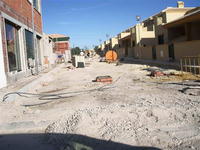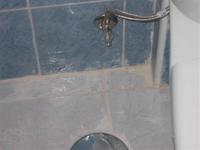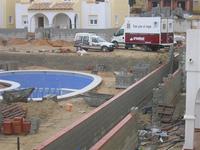

As a building settles on its foundations, there can be significant knock-on effects to its structure and finish. Problems can range from major shifts of the building’s structure, to a cupboard sticking or drains not working. Identifying faults and getting them rectified before you complete a property purchase is called ‘snagging’.
An estimated 40%+ of new houses in the UK are professionally snagged. In Spain, less than 5% of new builds pass a professional inspection by the purchaser. A typical three-bedroom, two-bathroom house may have more than 650 different points to check in the building and its surroundings. This process is not the same as a ‘survey’ which consists of checking the underlying structure of the building and its foundations. Snagging checks that the building is fit for habitation and fits its specification, being as near to perfect as practically possible.

Snaggers typically advise 26% of clients not to complete until serious problems encountered on inspection are fixed. Prices for a snagging inspection can range from €260-400, depending on the size of the property. If you are not yet resident in Spain and inspection involves travel, this is a small price to pay. When planning for property completion, make sure you take into account costs for flights, hotels and car hire; what if you have to make more than one trip?
A survey of new builds in Spain showed the following distribution of problems among reported faults:
Once a house or apartment is nearing completion, the agent/promoter/developer will usually contact you to arrange an inspection. You will arrive and inspect the property as best you can. Often, the agent and a couple of builders will be peering over your shoulder and your comments may be accompanied with sharp intakes of breath, head shaking and shrugging of shoulders.

You will then be presented with a snag list in Spanish and asked to sign it. You may not understand it properly, and the agent may tell you all is in order and the things you have pointed out will be fixed. You may then discover you are booked into the notary to complete the purchase of the property that afternoon or the next day. This leaves no time for any of the snags to have been rectified before you complete. Doesn’t sound like much fun, does it?
By law, builders in Spain are required to offer a 10-year insurance-backed warranty on newly built properties (this is not a guarantee like the NHBC in the UK). The requirements for builders in Spain are as follows:
First ten years: The builder must take out seguro decenal insurance. This is a ten-year insurance policy that guarantees the costs of repair in the event of a structural failure in the building.

If you have any doubts about your property as it ages, it is important to have an inspection done prior to any deadline so any defects or faults can be registered with the builder. Failure to do so will mean you are not covered by any protection.
Before completion, it is important you check that your builder has the statutory, minimum insurance in place covering your building. When the builder or the agent tell you a house, block or flat is guaranteed or insured for ten years you now know what they mean.
Snagging is a normal and expected part of the building process. You can do it yourself, but are you experienced, qualified and equipped to do it properly? Are you experienced enough to notice that the electricity is only on the builder's supply running at 180 volts, and not the normal 230-250 volts. Have you got a damp meter, can you test for earth bonding? Do you have any idea what earth bonding is?
The other alternative is to leave the process to the sales agent, promoter or builder. The bad news is that all of these interested parties probably just want to get you to part with your money as soon as possible. You will then be on your own to try and negotiate fixes once you've signed for the property. Not all agents or builders are rip-off merchants or cowboys; many are responsible and responsive, as their business relies on their reputation. Even with the good guys, someone has to be there to say, “This is not right!” in order to get it fixed in the first place.
By Roy Howitt, MD www.inspectahomespain.com
Spain Tel: 965 319 743 - Mobile: 627 955 748
UK Tel: 0844 738 068